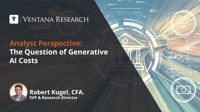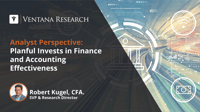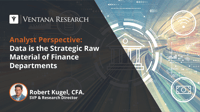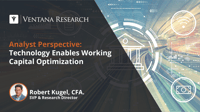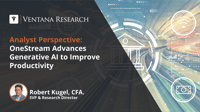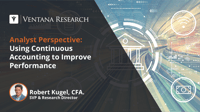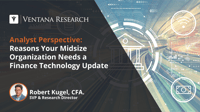The six costliest words in managing a finance department are, “we’ve always done it this way.” Closing the books is the process of finalizing and summarizing the financial activities of a business for a specific accounting period (typically a month, quarter, or fiscal year). It involves completing various tasks to ensure that all revenue, expense, and other financial transactions are properly recorded, accounts are balanced, and financial statements are prepared. Accounting processes are...
Read More
Topics:
Office of Finance,
ERP and Continuous Accounting,
digital finance,
AI & Machine Learning,
Revenue, Lease and Tax Accounting,
Consolidate/Close/Report
As we celebrate the first half of what seems to be the year of generative artificial intelligence, with an apparently unlimited discussion of use cases and bogeymen, my attention is turning to the very mundane question of costs. Specifically, how costs incurred – through investment and operation – will be distributed along the value chain and how this will affect the demand for AI ‒ by whom and for what purpose. It’s a question that needs asking even though, at this stage in the market’s...
Read More
Topics:
Office of Finance,
Continuous Planning,
Business Planning,
Enterprise Resource Planning,
natural language processing,
digital finance,
AI & Machine Learning,
Consolidate/Close/Report,
Continuous Supply Chain & ERP
I recently attended Sage Software’s Partner Summit. Implementation partners account for most of the sales and implementation of finance and accounting applications designed for small and midsize businesses, so they are important to the success of the software vendor. These events are designed to inform partners of product enhancements and the product and technology roadmap as well as provide a perspective on market conditions and trends.
Read More
Topics:
Office of Finance,
Business Planning,
ERP and Continuous Accounting,
digital finance,
AI & Machine Learning,
Purchasing/Sourcing/Payments,
Consolidate/Close/Report
Planful, a financial planning and consolidation software vendor, held its annual Perform23 user conference in May. The event showcased the company’s ongoing investments to provide finance and accounting departments with the means to improve effectiveness by enhancing efficiency.
Read More
Topics:
Office of Finance,
Business Planning
The Office of Finance can be compared to a numbers factory where the main raw material, data, is transformed into financial statements, management accounting, analyses, forecasts, budgets, regulatory filings, tax returns and all kinds of reports. Data is the strategic raw material of the finance and accounting department. It is the key ingredient in every sale and purchase as well as every transaction of any description. Quality control is essential to achieving high standards of output in any...
Read More
Topics:
Office of Finance,
embedded analytics,
Analytics,
Business Intelligence,
Data Management,
Business Planning,
ERP and Continuous Accounting,
data operations,
digital finance,
AI & Machine Learning,
operational data platforms,
Analytic Data Platforms,
Revenue, Lease and Tax Accounting,
Purchasing/Sourcing/Payments,
Consolidate/Close/Report
Ventana Research expanded its core Office of Finance focus areas this year to reflect new and important opportunities to use technology to gain effectiveness through greater efficiency. The focus area we caption as “Purchasing, Sourcing and Payments” also includes receivables. Doing a better job of record-keeping and organizing paperwork, especially in a minutiae-laden process like order-to-cash, may seem trivial. Yet, when the pandemic required organizations to lock down in early 2020,...
Read More
Topics:
Office of Finance,
Purchasing/Sourcing/Payments
We’ve experienced an unusual, decades-long monetary policy in the developed world that emphasized interest rate repression as well as supply chain practices designed for lowest cost. This has produced a generation of chief financial officers likely unprepared to address the impact of fundamental changes now shaping a new, technology-driven approach to working capital optimization. Today’s CFOs must assess their working capital management processes and the systems that support them to balance...
Read More
Topics:
Office of Finance,
Enterprise Resource Planning,
continuous supply chain,
digital finance,
Sustainability Management,
Purchasing/Sourcing/Payments
OneStream offers a platform designed to serve the needs of accounting and financial planning and analysis organizations. The software handles financial close and consolidation, planning and budgeting, analysis and reporting. The most notable part of the company’s presentations at its annual user group meeting – Splash – was the strategy and roadmap for its two artificial intelligence initiatives, Sensible ML and Sensible GPT. The former, unveiled last year, is a platform approach to applying...
Read More
Topics:
Office of Finance,
digital finance,
AI & Machine Learning
In 2015, I began using the term continuous accounting to call attention to technology advances that enable finance and accounting departments to improve performance. These advances have continued, making an even more compelling case for adoption of continuous accounting.
Read More
Topics:
Office of Finance,
ERP and Continuous Accounting,
digital finance,
Purchasing/Sourcing/Payments,
Consolidate/Close/Report
The chief financial officer of a midsize organization faces a different set of challenges than those in larger or smaller enterprises. These organizations have grown to the point of requiring capabilities similar to larger businesses, but typically lack the staff or financial resources afforded to bigger organizations. The past decade of IT innovation – especially the expansion of cloud computing – has brought substantial benefits to midsize finance and accounting operations. Rapidly growing...
Read More
Topics:
Office of Finance,
Business Planning,
ERP and Continuous Accounting,
digital finance,
Consolidate/Close/Report



